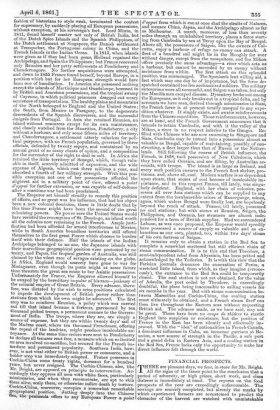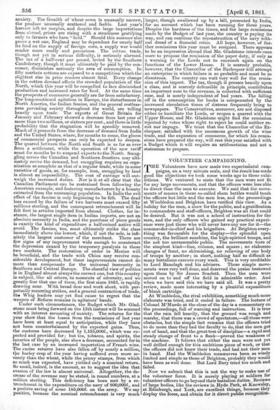FINANCIAL PROSPECTS.
HERE are pleasant days, we fear, in store for Mr. Bright. T 1 All the signs of the times point to the conclusion that a period of adversity, or high prices, short work, and class distress is immediately at hand. The reports on the food prospects of the year are exceedingly unfavourable. The sowings are scarcely completed, but already the marks by which experienced farmers are accustomed to predict the character of the harvest are watched with unmistakable anxiety. The breadth of wheat sown is unusually narrow, the produce unusually scattered and feeble. Last year's harvest left no surplus, and despite the large importations from abroad, prices are rising with a steadiness gratifying only to farmers who have "held." Should this summer also prove a wet one, England may be dependent for nearly half its food on the supply of foreign corn, a supply war would render more costly and precarious. The cotton trade, though not yet in serious difficulty, is seriously alarmed. The tax of a half-cent per pound, levied by the Southern Confederacy, though it must ultimately be paid by the con- sumer, diminishes seriously the area of consumption. In fifty markets cottons are exposed to a competition which the slightest rise in price renders almost fatal. Every change in the cotton demand affects the crowded population of the North, which this year will be compelled to face diminished production and increased rates for food. At the same time the prospects of commerce generally are far from satisfactory. The long-continued agitation in Europe, the disturbances in North America, the Indian famine, and the general restless- ness pervading society throughout the world, are telling heavily upon trade. The exports of Great Britain for January and February showed a decrease from last year of more than two millions, or sixteen per cent., and there is little probability that the stagnation will be speedily removed. Much of it proceeds from the decrease of demand from India and the United States, where, for months to come, the gloom of commercial prospects can only be expected to deepen. The quarrel between the North and South is as far as ever from a settlement, while the operation of the new tariff must for months be to suspend exports to the North. Smug- gling across the Canadian and Southern frontiers may ulti- mately revive the demand, but smuggling requires an orga- nization as complete as that of a regular trade, while in some varieties of goods, as, for example, iron, smuggling by land is almost an impossibility. The cost of carriage will out- weigh the increased duties. Nor is it at all clear that the Canadian Parliament can be restrained from following the American example, and fostering manufacturers by a bounty extracted from the consuming population. In India the evil effect of the famine is only beginning to be felt. The dead loss caused by the failure of two harvests must exceed fifty millions sterling, and the consequent retrenchment will be felt first in articles imported from abroad. Clothes, for in- stance, the largest single item in Indian imports, are not an absolute necessity in India, and the purchase of piece goods is exactly the kind of expenditure a half-ruined native will avoid. The famine, too, must ultimately strike the class immediately above the lowest, which, if not the sole, is infi- nitely the largest customer of the merchant. There are few signs of any improvement wide enough to counteract the depression caused by the temporary, xaralysis in these two markets. The restoration of order in Mexico will be beneficial, and the trade with China may receive con- siderable development, but these improvements cannot do more than compensate for the universal insecurity in Southern and Central Europe. The cheerful view of politics is in England almost always the correct one, but this country is subject, like all others, to moments of adversity, and we greatly fear that one of them, the first since 1855, is rapidly drawing near. With bread dear and work short, with per- petually recurring strikes, and a general contraction of trade, the Whig leaders may yet find cause to regret that the weapon of Reform remains in agitators' hands. Under such circumstances, the Budget which Mr. Glad- stone must bring forward on the 15th instant will be scanned with an interest savouring of anxiety. The returns for the year show that the losses from the remissions of last year have been at least equal to anticipation, while they have not been counterbalanced by the expected gains. Thus, the customs have decreased by 1,155,0001., which was ex- pected and provided for; but tea, tobacco, and spirits, the luxuries of the people, also show a decrease, accounted for in the last case by an increased importation of French wine. The excise returns have also fallen off by nearly a million, the barley crop of the year having suffered even more se- verely than the wheat, while the penny stamps, from which so much was expected, have yielded only a nominal return. So small, indeed, is the amount, as to suggest the idea that evasion of the law is almost universal. Altogether, the de- crease of the revenue may be stated, in round numbers, at a million sterling. This deficiency has been met by a re- trenchment in the expenditure on the navy of 800,0001., and a positive saving of some 185,0001. on the army. We say . positive, because the nominal retrenchment is very much larger, though swallowed up by a bill, presented by India, for an account which has been running for three years. Despite the hardness of the times, and the large remissions made by the Budget of last year, the country is paying its way, and can continue the reconstruction of the navy with- out dread of a financial crisis. All hope, however, of fur- ther remissions this year must be resigned. There appears to be an impression abroad that Mr. Gladstone intends once more to propose the remission of the paper duty, if only as a warning to the Lords not to encroach again on the functions of the Lower House. It is scarcely probable, however, that the Chancellor of the Exchequer will attempt an enterprise in which failure is so probable and must be so disastrous. The country can wait very well for the remis- sion of this impost. The tax, though it presses heavily upon a class, and is scarcely defensible in principle, contributes an important sum to the revenue, is collected with sufficient ease, and is nearly independent of bad years. The falling off in the consumption for books is compensated by the increased circulation times of distress frequently bring to newspapers. The Conservatives, moreover, are not disposed either to humiliate the Lords, or reopen a quarrel with the Upper House, and Mr. Gladstone might find the remission rejected by votes whose right to reject he could neither re- sist nor impugn. We trust that the Chancellor of the Ex- chequer, satisfied with the enormous growth of the wine trade, and the expansion of commerce, for which his remis- sions have prepared the way, will rest this year satisfied with a Budget which it will require an arithmetician and not a statesman to prepare.































 Previous page
Previous page